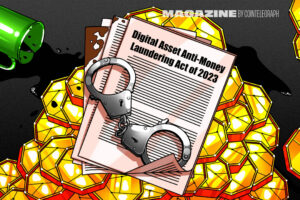
The New York Times’ latest report on Bitcoin (BTC) mining, titled “The Real-World Costs of the Digital Race for Bitcoin,” has irked many BTC proponents — some of whom took to Twitter to call out certain aspects of the report, including saying it was “cherry-picking” data.
The NYT article says Bitcoin mining has a “voracious” appetite and claims it uses as much energy as all residences in New York City.
In response, Daniel Batten — a Bitcoin environmental, social and governance (ESG) analyst — pointed toward what he said were two major instances of cherry-picking data alongside neglecting the increased use of renewable energy in the mining sector.
Batten said the NYT article drastically exaggerates the actual fossil fuel use of BTC miners, with emission levels overstated by an average of 81.7%. He added the report was “using overwhelmingly incomplete datasets to support a thesis.”
Batten also mentioned that there are 26 Bitcoin miners in the United States and Canada using 90% sustainable energy to fuel their mining activities, but the NYT article chose just two and focused on the sites least backed by renewable energy.
Troy Cross, another Bitcoin proponent, said the NYT article used “marginal emissions accounting” to prove its narrative, selectively applying it only for carbon emissions, not generation.
It’s a shame, because I know months of work went into it, and the photography, layout, and graphics are superb as always.
— Troy Cross (@thetrocro) April 10, 2023
Dennis Porter, CEO of the Satoshi Act Fund, noted that the NYT article made a mistake in its initial reporting, naming the incorrect town in which a BTC mining facility in Texas is based. The publication later corrected the error.
Wow. The NYT couldn’t even take the time to fact check the town that #Bitcoin mining is taking place in.
It’s to Rockdale, Texas. Not Rockland.
These are not serious people. pic.twitter.com/72ed3uIiga
— Dennis Porter (@Dennis_Porter_) April 10, 2023
Pierre Rochard, vice president of research at BTC mining firm Riot, accused the NYT of using “fictitious fractional-reserve carbon accounting” and “cooking the books to fabricate emissions.” Another Twitter user, Hakan, pointed toward passages they believed to be fear-mongering.
While the high energy consumption required for Bitcoin mining is definitely a topic of debate, mining is significantly important for the blockchain. Not only is it used to verify transactions, it also makes it decentralized and adds a layer of security.
Related: Bill protecting Bitcoin mining rights passes in Arkansas Senate and House
According to the Bitcoin Mining Council report for Q4 of 2022, the Bitcoin network is already a leader in sustainable energy use, with 58.9% of its energy coming from renewable sources.
The Bitcoin network‘s sustainable power mix vs. countries. Source: Bitcoin Mining Council
Bitcoin mining has always been a controversial topic, often fueled by critical articles published by mainstream outlets claiming it has a net negative impact on the environment. However, many Bitcoin proponents see these sorts of reports as hit pieces and are quick to offer an opposing perspective. Meanwhile, some are actively campaigning to change Bitcoin’s mining consensus to the more environmentally friendly proof-of-stake.
Cointelegraph Magazine: Bitcoin in Senegal: Why is this African country using BTC?
















